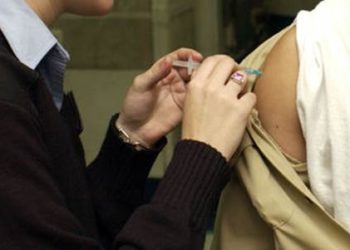Patient Basics: Mumps
Originally published by Harvard Health.
What Is It?
Mumps is an infection with a virus that causes swelling of the parotid glands in front of each ear. The parotid glands make saliva. Mumps is caused by the mumps virus, a type of paramyxovirus that spreads from person to person through coughs, sneezes and saliva, as well as through contact with contaminated items and surfaces (used tissues, shared drinking glasses, dirty hands that touched a runny nose). Once the mumps virus enters the body, it passes into the bloodstream and can spread to many different glands and to the brain:
- Salivary glands — Mumps causes pain and swelling in the parotid gland and in other salivary glands located under the tongue and jaw.
- Testes — In the testes, mumps infection can cause swelling, pain, tenderness and, sometimes, permanent shrinkage (atrophy), although it rarely causes sterility.
- Ovaries — In women, mumps infection of the ovaries can cause pain in the lower abdomen but doesn’t lead to infertility.
- Pancreas — The mumps virus may cause inflammation and infection of the pancreas and abdominal pain.
- Brain — Once it enters the bloodstream, the mumps virus also can travel to the brain, where it may cause meningitis (inflammation and infection of membranes covering of the brain) and encephalitis (brain infection). This brain involvement (which is very rare) sometimes leads to long-term complications, such as deafness, paralysis (weakness, especially of facial muscles), hydrocephalus and seizures.
Rarely, the mumps virus can affect other parts of the body, such as the joints, thyroid gland or lungs.
When a pregnant woman develops mumps, there may be some increased risk of fetal death and miscarriage if the mother is in her first trimester. However, the infection probably does not increase the risk of birth defects.
People with mumps are contagious during a period that begins 48 hours before and ends 6 to 9 days after the beginning of the mumps symptoms. Before an effective vaccine became available in the late 1960s, there were almost 190,000 reported cases of mumps each year in the United States. Now, thanks to the mumps vaccine, the number of annual cases has decreased by more than 99%, so that only 1 out of 1 million people in the United States gets mumps.
Symptoms
In about 15% to 20% of patients, mumps does not cause any symptoms. When symptoms occur, they usually begin 14 to 18 days after exposure to someone with a mumps infection.
In about half of patients, symptoms of mumps infection may include fever, headache, sore throat, muscle aches, poor appetite and malaise (a general feeling of sickness). The mumps virus causes pain and swelling in front of the earlobe, called parotitis. Because of the pain of parotitis, chewing and swallowing may be very uncomfortable, and the patient may not feel like eating.
Infrequently, male teenagers and adults with mumps can develop swelling and pain in one or both testes (orchitis). In women, the ovaries may be involved, which can cause lower abdominal pain.
In patients of either sex, but more commonly in adults than in children, there also may be more serious complications including:
- Mumps pancreatitis, which causes pain in the upper abdomen
- Aseptic (not bacterial) meningitis, which causes headache, stiff neck and drowsiness
- Mumps encephalitis, which causes high fever and unconsciousness, although this occurs in less than one in 1,000 patients with mumps
Diagnosis
Your doctor will ask about your exposure to any person who is known to have mumps or facial swelling. Even if you did not have face-to-face contact with this person, your doctor will want to know if you attended the same school, lived in the same household or dormitory, or worked in the same building. Your doctor also will want to know whether you were immunized against mumps, when you were immunized, and the number of doses of mumps vaccine you received. Mumps vaccine often is given as part of the measle/mumps/rubella vaccine, or MMR, shot.
Your doctor will suspect that you have mumps if you have had tender parotid swelling on both sides for at least two days and if you have a history of being exposed to someone with mumps. In patients without parotid swelling, the diagnosis can be confirmed with blood tests that measure specific antibodies (defensive proteins made by the immune system) against the mumps virus. Also, the mumps virus itself may be detected in samples of urine, saliva or cerebrospinal fluid (fluid surrounding the brain and spinal cord), which is obtained with a lumbar puncture, or spinal tap.
Expected Duration
Symptoms of mumps generally last about 10 days. Once you recover, you usually are immune from getting the mumps virus for the rest of your life.
Prevention
You can prevent mumps with the mumps vaccine, which is usually given as part of the MMR combination. This live-virus vaccine generally is not recommended for pregnant women or for patients who are taking certain medications or have medical problems that suppress the immune system.
Because patients with mumps are contagious for about 48 hours before they develop symptoms, it usually is not necessary to isolate them from other members of the household once symptoms begin. This is because family members probably were exposed to the virus during that 48-hour period before symptoms began.
Children with mumps usually are excluded from school or child care for five days after parotid gland swelling begins. Local public health officials usually are involved to help control outbreaks.
Treatment
In patients who are generally healthy, the symptoms of mumps are treated with:
- Acetaminophen (Tylenol) to reduce fever and relieve general body discomfort
- Warm or cold compresses to relieve pain and swelling in the parotid glands
- A soft diet to reduce the need for chewing — avoid fruit juices and tart beverages that stimulate the salivary glands and make gland pain worse
- Cool compresses and support for the scrotum to reduce pain and swelling in the testicles
Aspirin should not be used in children with mumps because of the risk of Reye’s syndrome, a serious brain problem that develops in children who have certain viral illnesses and have been treated with aspirin.
When To Call a Professional
Call your doctor if you or someone in your family develops symptoms of mumps, even if they have been vaccinated against mumps. Also, if a mumps outbreak occurs in your school or workplace, call your doctor to determine if you are immune to mumps. If you are a woman who is considering becoming pregnant, be certain that your immunizations are up to date.
Prognosis
People recover completely from mumps. In males, there is a small risk of sterility if the infection affects both testicles (bilateral orchitis), but this is unusual.
Additional Info
National Center for Infectious Diseases
Office of Health Communication
Centers for Disease Control and Prevention
Mailstop C-14
1600 Clifton Road
Atlanta, GA 30333
Toll-Free: 1-888-232-3228
http://www.cdc.gov/ncidod/
Centers for Disease Control and Prevention (CDC)
1600 Clifton Road
Atlanta, GA 30333
Phone: 404-639-3534
Toll-Free: 1-800-311-3435
http://www.cdc.gov/




